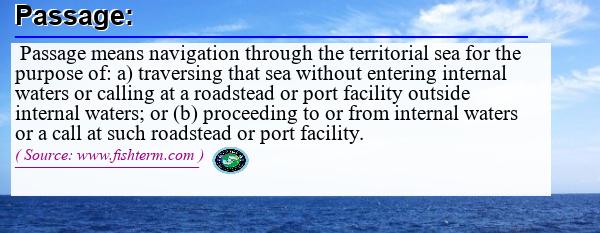Passage - meaning and illustration
TABLE OF CONTENTS
Reading time:
Last modified:
2023-03-03 00:00:00
1. Synonyms, etymology, translation, definition, examples and notes
1.1. Subject field:
- Marine navigation. (Hierarchy:
- Fisheries >
- Aquatic navigation >
- Marine navigation )
- River navigation. (Hierarchy:
- Fisheries >
- Aquatic navigation >
- River navigation )
1.2. IPA transcription and prononciation for passage:
Pas•sage BrE /ˈpæsɪdʒ/ NAmE /ˈpæsɪdʒ/
Graph 1 : passage - Google ngram extract ( graph of term etymology and evolution. Source: Google ngram )
1.3. French translation of passage:
Passage can be translated into French as:1.4. Definition of passage in fisheries:

1.5. Plural of passage:
Passages;
1.6. Usage example of passage:
"Maritime navigation is navigation at sea and in those parts of rivers and canals that are in principle open to the first permanent obstacle to the passage of seagoing vessels. principle up to the first permanent obstacle to the passage of seagoing vessels. " (Ordinance No. 62-0F-30 of March 31, 1962 on the Code of Merchant Marine Fishing in Cameroon, article 4, paragraph 1)
Fishery terminology records for Passage
1. Ordinance No. 62-0F-30 of March 31, 1962 on the Code of Merchant Marine Fishing in Cameroon, article 4, paragraph 1:
" Maritime navigation is navigation at sea and in those parts of rivers and canals that are in principle open to the first permanent obstacle to the passage of seagoing vessels. principle up to the first permanent obstacle to the passage of seagoing vessels. "
2. United Nations Convention on the Law of the Sea, article 8, paragraph 2:
" 2. Where the establishment of a straight baseline in accordance with the method set forth in article 7 has the effect of enclosing as internal waters areas which had not previously been considered as such, a right of innocent passage as provided in this Convention shall exist in those waters. "
3. United Nations Convention on the Law of the Sea, article 17, paragraph 1:
" Subject to this Convention, ships of all States, whether coastal or land-locked, enjoy the right of innocent passage through the territorial sea. "
4. United Nations Convention on the Law of the Sea, article 18, paragraph 1:
" Passage means navigation through the territorial sea for the purpose of: (a) traversing that sea without entering internal waters or calling at a roadstead or port facility outside internal waters; or (b) proceeding to or from internal waters or a call at such roadstead or port facility. "
5. United Nations Convention on the Law of the Sea, article 18, paragraph 2:
" Passage shall be continuous and expeditious. However, passage includes stopping and anchoring, but only in so far as the same are incidental to ordinary navigation or are rendered necessary by force majeure or distress or for the purpose of rendering assistance to persons, ships or aircraft in danger or distress. "
LEAVE A COMMENT




 Linkedin
Linkedin share
share tweet
tweet